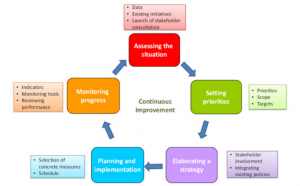Examples of national and regional waste prevention plans
There are a number of national and regional waste prevention plans already in place, notable for their diversity of approaches and objectives. Some of them are described at european comission’s handbook “GUIDELINES ON WASTE PREVENTION PROGRAMMES”. This handbook is designed to help EU Member States and other interested parties take advantage of the many opportunities in waste prevention and resource efficiency. For the full handbook click here.
The Waste Prevention and Recovery Strategy of Austria 2006-2011 aims broadly to promote resource conservation and reduce the generation of greenhouse gas emissions, hazardous waste and other pollutants. The strategy focuses on the minimization and reuse of construction and demolition waste, the promotion of Material Flow Analysis for products and the development of reusable packaging. The strategy is implemented at regional level through the Austrian Provincial Waste Management Plan, which calls for regional authorities to a) Analyze the waste generated locally and design waste prevention campaigns based on local circumstances, b) Stimulate public engagement through awareness campaigns, c) Promote household composting, d) Publish guidelines for product hire, repair and resale, e) Minimize waste in public works and increase use of recycled construction materials and f) Introduce EMAS to local businesses to support business waste reduction. For further information click here.
Finland’s National Waste Prevention Program was developed to reduce the generation of waste and minimize its harmful impact on human health and the environment. Released in 2009 as part of the Finnish National Waste Plan for 2016 entitled ‘Towards a Recycling Society’, the program aims to a) Improve the material efficiency of products, b) Increase the material efficiency of industry and construction, c) Extend the useful life of buildings, d) Reduce the generation of household waste and boost consumer interest in eco-efficient products and services.
The Waste Strategy for England was published by DEFRA in 2007. The strategy describes the context for waste prevention and management in terms of ‘One Planet Living’, explaining that if every country used natural resources at current UK levels, it would take three planets to meet demand. Given this outlook, zero growth goals are not sufficient. The waste strategy is part of the UK’s wider framework of the carbon and resource management. The objectives of the new strategy, as relates to waste prevention, are to a) Strengthen incentives for households, businesses and local authorities to reduce waste, b) Decouple waste growth from economic growth and emphasise waste prevention and reuse over other waste management strategies, c) Develop agreements with producers of specific waste streams to reduce waste and increase recycling and d) Reduce household waste generation by 29% by 2010 and by 45% by 2020. The strategy features greater targets for recycling and energy recovery. For further information click here.
The framework below for the design and implementation of national waste prevention programmes facilitates national authorities to structure and develop a waste prevention programme.
Disclaimer
The views expressed in this publication do not necessarily reflect the views of the European Union, the participating countries and the Managing Authority.
